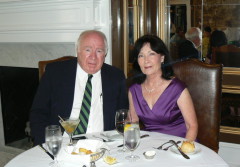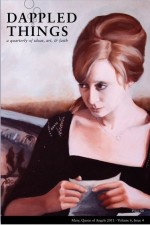About My Writing
There are some fiction writers who perceive people as good because God made them to be like Him. I am one of them.
I also recognize free will. We can choose not to be like Him, and even choose not follow Him. But the job of a writer who sees people as coming from God, is to translate His goodness in some concrete form for her readers; and that is a difficult job in our world today because many don’t believe in a Creator, and others don’t see our world as good. So what is such a writer to do?
First, I believe this sort of writer will have strong emotion about current events where goodness is not: The murder of children. Debilitating disease. Sadistic, sexual perversion. Dishonesty. Meanness, and on and on--just check ‘I choose not to follow” on each of The Ten Commandments. The question then becomes, “Can God, our Creator, be found where goodness is not?”
Yes. And He is powerful enough to draw out goodness from atrocities that emanate because of the misuse of human free will.
In this writer’s imagination, there is a link between the divinity of God (the supernatural world) with the natural world. The task becomes that of interlocking the two. Representations are created, and specific truths about God’s presence in our world appear in the writer’s mind. She translates it in her settings, characters, and dilemmas. And what she translates is a tenet called grace, both Sanctifying Grace and Actual Grace. Sanctifying Grace, inherited from the God who made us, lives in the soul and stays in the soul. By contrast, Actual grace doesn’t live in the soul; rather, throughout a lifetime, it acts in the soul as divine pushes from God toward His goodness. But those pushes require cooperation. The translating writer understands that a person must accept grace on his own free will; and grace, like love, is sometimes prickly.
A writer who translates grace in a world on edge, sees a double beginning and ending in everything, and I mean everything, including the awful, current events mentioned above. Along with this, she realizes that knowing ‘reasons why’ is a human characteristic. She perceives a cause, and an effect that creates another cause, and effect, and so on into infinity. Stories are discovered in her imagination and brought to light by a very intimate flashlight, one that shines a light on the many causes and effects of free will, and on the causes and effects of grace; both working, and often conflicting, in the same human soul.
About Me
Name: Kaye Hinckley
Hometown: Dothan, Alabama
Graduate of Spring Hill College, Mobile, AL. Creative writing: University of Alabama.
ROLL TIDE!
Hobbies: Writing, (more than a hobby!) Painting, Grandchildren!
Music: Classical and Country
Movies: Love the old black and whites
Languages: English, un peu French
My motto: God loves you madly, so let Him.
Second Place winner for Novel, Florida's First Coast Writing Festival, 2007 for The Wind That Shakes the Corn. Finalist, Semi-finalist, and Honorable Mentions in The William Faulkner/William Wisdom Competition, Lorian Hemingway Short Story Competition, and Alabama Conclave of Writers Contest. Third-place winner, and Honorable Mention for Short Stories in 2012 Tuscany Prize Collection.
My debut novel, A Hunger in the Heart, published by Tuscany Press. Short Stories Published by Tuscany Press, Dappled Things, The State Street Review, The Woodrider.
Tuscany Press, LLC
Tuscany Press is the publisher of Kaye Park Hinckley's debut novel, A Hunger in the Heart. An integral part of the Catholic literary Revival, Tuscany Press is dedicated to Catholic Fiction and sponsor of Tuscany prize for Catholic Fiction. Tuscany Press publishes stories with human frailties, beauty, grace, love, redemption, hope, courage and -the presence of God.
Dappled Things
Dappled Things is publisher of Red Bird, a short story by Kaye Park Hinckley. (Mary, Queen of Angels issue, 2011. Another of Hinckley's short stories, Dragon, is included in the Candlemas 21013 issue.
Dappled Things is a literary magazine dedicated to providing a space for emerging writers to engage the literary world from a Catholic perspective. The magazine is committed to quality writing that takes advantage of the religious, theological, philosophical, artistic, cultural, and literary heritage of the Catholic Church in order to inform and enrich contemporary literary culture.




